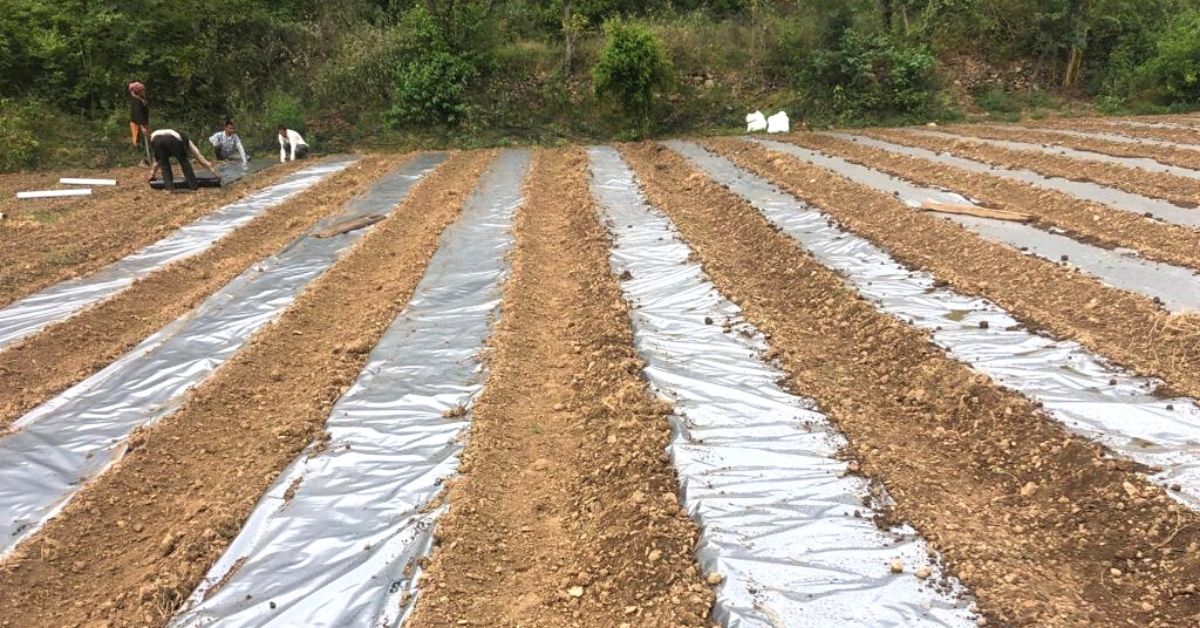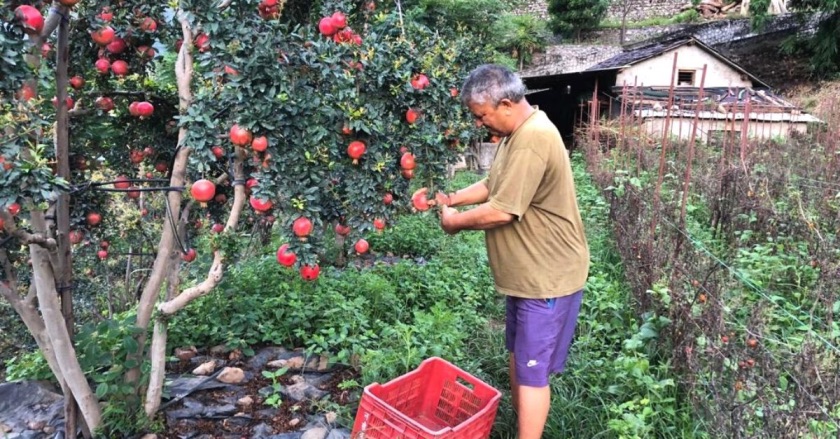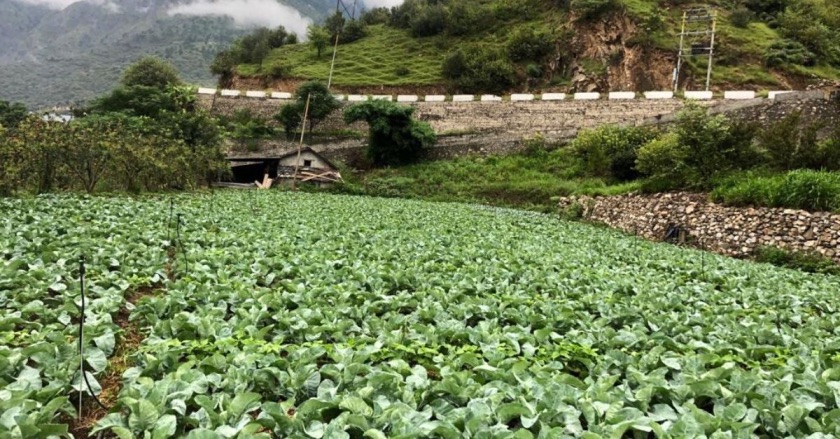It may now seem like a common sight to find pomegranate and apple orchards while visiting Hatal and its neighbouring villages in the northern state of Uttarakhand. However, about two decades ago, farmers in the same region struggled to grow and attain a promising yield from the two plants.
Premchand Sharma, a native of Hatal and a Class 5 dropout, faced a similar situation. “I belong to a family of traditional farmers, and my father grew crops like rice, pulses and corn, among others. The soil and the geographical conditions never suited horticulture,” he tells The Better India.
Premchand recalls seeing a pomegranate plant for the first time being grown by a neighbour across the street. “I saw it during my childhood when a farmer experimented in growing the fruit variety. But the fruits suffered pest infestations, and the plant died due to various diseases. It was difficult to contain the infestation,” the 64-year-old says.
Moreover, Premchand says that the agriculture department officials, experts and other traders involved in the chemical fertiliser businesses in the region did not have any solution for the infestation. “The products were underdeveloped, and the experts lacked knowledge and experience,” he adds.
But consistent efforts and sincerity helped Premchand grow pomegranate and apple varieties with success, eventually winning him a Padma Shri Award for his contribution to the agriculture field.
Taking Maharashtra’s pomegranate to Uttarakhand

Premchand says the pomegranate tree in front of his house intrigued him. “I always wanted to find solutions to remove the infestation from the plant. The fruits were also small in size. Moreover, there were many wild pomegranate plants in the forest areas. I realised that growing a pomegranate tree would not be a problem, but controlling pests and harvesting a yield was,” he says.
The farmer visited officials and scientists from the forest and agriculture department to seek guidance. None of them offered solutions. “It is not possible to grow in this geographical area, they claimed,” he adds.
Later, he learned that the plant could be grown by two methods — seeds or grafting.
“In the year 1990, I researched about different varieties of pomegranates. I even visited Solapur in Maharashtra and was impressed by the yield because of its large fruit size. I sourced 500 grafted saplings of the Bhagwa variety to my hometown. They were also less susceptible to infestation,” he says, adding, “The plants also required less water for irrigation, compared to the native varieties.”
At last, the plants bore fruits successfully. “But the fruits had many seeds, and their size was huge. Each fruit weighed at least a kilo,” Premchand says.
Confident in selling the fruits, Premchand offered them to the customers in the local market but failed to find immediate acceptance.
“The big fruit size discouraged the mass buyers. Any person wanting to gift them couldn’t give one big fruit. Also, it was difficult for a family to consume a single fruit at a go. They were also aesthetically less appealing. The fruit vendors and commercial traders did not appreciate them,” Premchand explains.
He says despite the drawbacks, the fruit found a market with local customers. “The fruit was less juicy, but its quality was fresh as compared to other varieties like Himachal and Kullu in the market. Customers returned to buy fruits from me as they loved the taste,” Premchand notes.

The sales picked up and Premchand gained success, which eventually earned him an informal recognition as the ‘anarwala’ (pomegranate man) from the then-Chief Minister.
But Premchand realised that the pomegranate trees had a life of about 15-20 years and demanded a fresh cycle of different crops to restore soil nutrients. “So, I began growing papaya with other fruit varieties and seasonal vegetables alongside. It earned me considerable profits and covered my investment costs of pomegranate,” he says.
“I always visited various farmers to understand their techniques and implement the best practices. I adopted drip and mulching techniques in similar ways. Diversifying and finding innovative methods in farming proved crucial to increase income,” he says.
Recognising his success, other farmers in the neighbourhood started requesting him for the pomegranate grafts. “In 2000, I prepared a nursery of 2,000 saplings and sold them to 350 farmers in the state and neighbouring states of Himachal Pradesh and Uttar Pradesh,” he says.
By 2013, he formed a fruit and vegetable market committee to encourage farmers and youngsters in the village to grow farm produce and increase their production and profits. “About 200 farmers became a part of it, and many youngsters felt encouraged and took up farming as an activity rather than pursuing a job away from their hometown,” he says.
Utpal Singh, a farmer from Premchand’s village, says, “I felt inspired to grow pomegranate after he showed a successful way of commercialising it. Moreover, I also learned and adopted drip irrigation and mulching methods from Premchand. He has helped many farmers increase our yield in farming.”
An Organic Shift
In 2017, a visit to Punjab changed Premchand’s farming methods forever. “I attended a seminar that insisted farmers move away from harmful use of chemical fertilisers and pesticides. The experts mentioned the correlation with cancer cases because of the toxic chemicals used to grow vegetables,” he says.
So, Premchand felt pained by the case studies and the long term health effects because of the heavy chemical usage. “I was slightly aware and had already started reducing the use of chemicals on my farm, but stopped entirely after returning from Punjab and began practising organic farming. I even innovated organic liquid manure made from neem, walnut, carrot grass, congress grass, cow dung, cow urine, organic waste and other organic matter,” he says.

Premchand claims the use of his brewed organic liquid has helped him increase productivity and bring it at par with agricultural produce grown using chemical fertilisers. “I am in the process of registering it with the government agencies to obtain necessary certifications and commercialising it. The samples are undergoing tests for their precise scientific value and the percentage of yield it helps in increasing,” he adds.
Recently, Premchand planted an Italian variety of apples in his village. “Apples are not known to grow in our part of the state. I have planted a high-density variety that bears fruits in a year and is low hanging. It has brought success to me, and many farmers are now picking up the trend,” he adds.
Last year, he received the Padma Shri Award for his immense contribution to agriculture. “I appreciate that the government recognised my efforts, but I had no support when I began pomegranate farming. The officials and residents discouraged me. Some people mocked and teased me for trying to grow something unique. But I feel glad that the same people now pat on my back, feel inspired and take up pomegranate farming,” he says.
Premchand says farmers should move to new farming methods to bring a new revolution in the field. “The drip irrigation, high-tech farming and organic methods, if implemented, can help farmers cope up with changing demands and markets. Such efforts will ensure to keep the farmer fraternity active and make farming a successful and potential profession for a younger generation,” he says.
Edited by Yoshita Rao
No comments:
Post a Comment